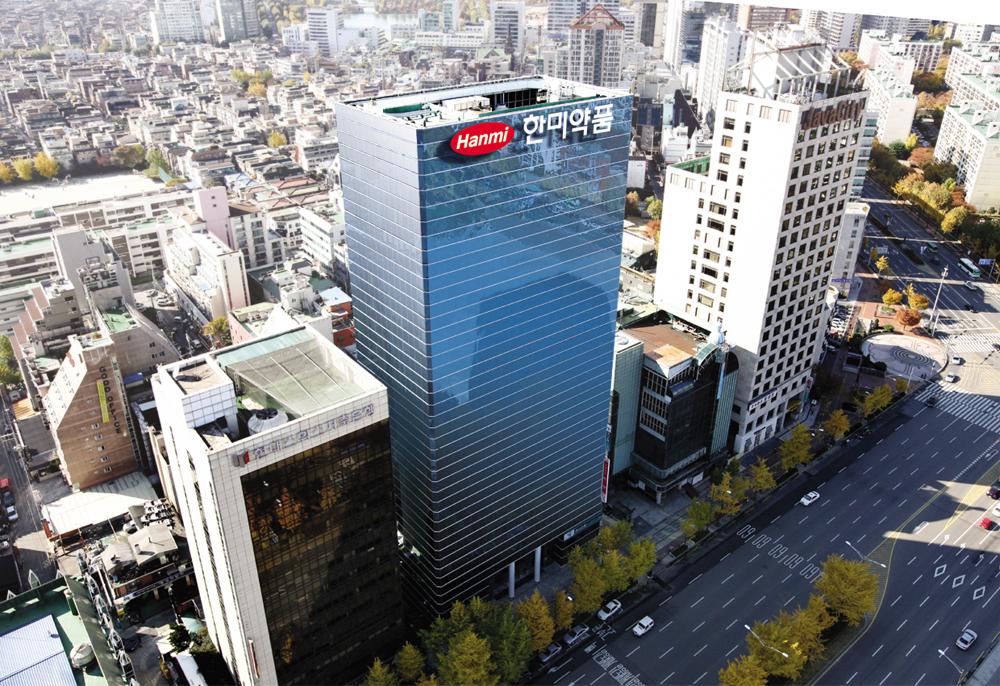Novel drugs developer Hanmi Science vowed Thursday to rev up its engine for Cydio Cigma -- six goals, standing for cyber education, digital bio, oral bio, city bio, green bio and marine Bio.
“Where there is no innovation, there is no development. Those who turn their backs on challenges are branded as cowards. Cydio Cigma is our goal and commitment for the post-COVID-19 era,” said Hanmi Science CEO Lim Chong-yoon at a meeting with executives in June.
Lim promised to reward employees with outstanding performance by raising their annual salary by 100 percent, regardless of their ranks, should they contribute to the six new goals embodied in Cydio Cigma.
For the first part of cyber education, Hanmi is launching an educational institution called Cyber Industry-University Cooperation Academy, hoping to attract more than 5,000 foreign experts.
This academy is built in collaboration with medical institutions in Italy and China, with whom Hanmi has existing partnerships for studies on low birthrates, neonatal health and postpartum care. The institutes include Catholic Medical School in Rome, and the Policlinico Universitario Agostino Gemelli and Beijing Union Medical School.
For digital bio, Hanmi is promoting a revolution in the medical industry by combining information and communications technology and big data for research and development. The latest outcome of Hanmi’s innovation for digital bio is the Paltan Smart Plant, which can produce 6 billion tablets annually and is 90-percent operated by unmanned system.
As for oral bio, Hanmi is focusing on the fact that most novel biologics in Korea are still injection-types. The company has experience developing more than 400 oral medicines, and plans to use its know-how to differentiate itself from existing major bio companies that have large factories.
Hanmi’s anticancer drug Oraxol, decked with patented platform technology Orascovery, is licensed-out to US-based Athenex since 2011. The drug was recently presented at the American Society of Clinical Oncology, having had cases of complete recovery in the most difficult groups of patients to treat in global clinical phase 3 trials.
The drugmaker foresees opportunities for the Orascovery technology’s application in COVID-19 vaccines. About 800 new COVID-19 related drugs are being developed around the world, but oral or non-injection drugs are rarely tried.
“We have already overcome countless failures. In face of the challenge of this pandemic, Hanmi will start preclinical trials of COVID MDT, the safest and the most effective treatment by integrating accumulated technology and innovative treatment models. There is no bigger failure than fearing challenges,” Lim said.
As for city bio, Hanmi has signed a memorandum of understanding with Pohang, North Gyeongsang Province, and the Daegu-North Gyeongsang Free Economic Zone Authority to build a smart health care city. This will be a 300 billion won ($248.7 million) business encompassing education, R&D and manufacturing facilities.
For green bio, Hanmi has a strategic business agreement with BioApp, a promising venture company in the field of plant biotech in Korea. Together, they will jointly develop and market plant-based bio products in domestic and international markets.
Hanmi signed a technology transfer contract with Duhu Liu, a professor at the Chinese Academy of Agricultural Sciences, for a new drug candidate related to metabolic disease, and started developing a new green bio drug. They are jointly carrying out the preclinical studies.
Regarding marine bio, Hanmi is opening a specialized center in Pohang.
The company sees the ocean as a bio-bank with vast potential. Hanmi cited the painkiller Prialt, made using sea snail toxins, which reportedly generated $27 million in sales in 2017. In another case, black sea sponge-based anti-cancer drug, developed in Japan and approved by the US Food and Drug Administration in 2010, reportedly generated $3.6 billion worldwide in 2017.
Hanmi anticipates the marine bio industry to grow to $8.05 billion by 2030.
It has been conducting around 500 drug developments and clinical trials of more than 30 new bio drugs over 50 years. The company is applying for a number of global patents for medical software to cure COVID-19 and is working with the National Institute of Health and Welfare to develop a system that will be applied on-site.
Following NIH’s announcement in April that it is striving to discover a potential COVID-19 vaccine using virus-like-particle, Hanmi said it considering a partnership to co-develop a candidate drug.
By Lim Jeong-yeo (
kaylalim@heraldcorp.com)








